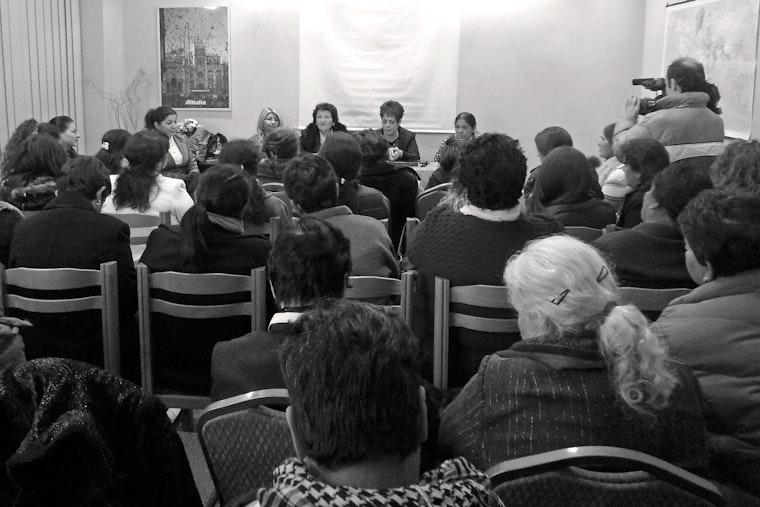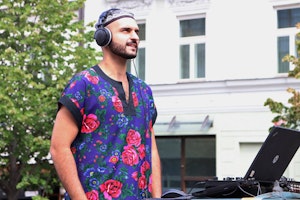Roma Women Raise Their Collective Voice, and Mayors Listen
By Manjola Veizi

Local government officials have long been blind to claims of Roma women in our country, but this will no longer be an option as newly elected politicians take office in city councils across Albania after last month’s elections.
Roma women face many challenges in Albania, in both public and private spheres: extreme poverty, high levels of unemployment, discrimination, gender inequality, domestic violence, and lack of access to health care and housing.
Many of these issues need to be addressed at the local government level. But when Roma women go to employment agencies, for instance, they are denied potential positions because they do not have the proper skills or education. “There is nothing we can do about that,” is what they hear from the agencies when the question of discrimination as the root cause of these deficits comes up.
I realized that something needed to be done to change the situation for women. In January 2014, I started organizing informal gatherings of Roma women in different Albanian cities with considerable Roma populations: Korca, Elbasan, Berat, Fier, and Tirana in the first half of the year, expanding to Durres and Lushnje later on.
I insisted that the gatherings take place outside of the home, in public spaces—cafés or parks, for instance—so that women could speak freely, liberated from domestic constraints. Frankly, it was not easy to convince them to come downstairs at first. They had lost faith that things could change.
“There have been many projects for Roma, but our situation has remained the same,” was what I heard from them most often. But eventually, through dialogue with myself and other women activists, they came to see that change should start with them.
We talked about general discontent related to issues affecting our community, and about how to make our claims heard, by both local politicians and by traditional, male-led Roma organizations.
Together, we started identifying the most pressing problems affecting our everyday lives. Most were linked to the well-being of the community, from fixing garbage collection sites and cleaning sewage canals to performing maintenance on streets that were dangerous for children. All of these could—and should—have been improved by responsive local governments. So we decided to take our claims, as a group, to city mayors to make our voices heard.
Two factors worked in our favor: 1) It was unusual for the mayors to face a large group of Roma women determined to advocate on their own behalf, and 2) our well-formulated and structured list of demands could positively impact the whole community. Furthermore, upcoming local elections meant that the mayors saw the benefit of addressing some of our most immediate concerns, such as fixing the sewage systems and garbage collection sites.
There were other successes. One of the women in our group, left homeless with her two children after her husband died, was denied social housing by the city council several times. Together, we went to the head of the council, and explained that her situation was ours as well. A few days later, they offered her a temporary apartment.
Each mayor we met with also promised an assessment of the housing needs of poor Roma families, including an application process for reconstruction and improvement of their homes.
This loosely organized group of citizens ultimately evolved into the Roma and Egyptian Women Network. Through this organization, we have been able to achieve many things that we couldn’t as individuals. Today, all the women of the network meet every day at an agreed-upon time, out of the house, to discuss claims and monitor the progress achieved in our communities.
The local elections in Albania last July proved the power of such organizing. We mobilized the Roma and Egyptian Women Network in Korca, Elbasan, Berat, and Fier, and focused on politicians running for office. Many of these politicians promised to consider our demands and collaborate with us on better implementation of local government plans for Roma, particularly those targeting women—for instance, not only instituting quotas for Roma women in administrative positions, but also on-the-job training to improve their chances in the employment market.
This mobilization was covered on TV and in the newspapers across the country. This month, as the local government officials take office, we will be there again to remind them of their commitments; we will be their democratic conscience.
To Roma women in other countries looking to achieve this level of political commitment, here is my advice: start the movement from within your own community. Most Roma women are just waiting for someone to structure their claims and formalize the movement. Build alliances with women movements and connect with other organizations—particularly male-led Roma organizations, as those can be a potential resource to empower all Roma women. Finally, keep encouraging Roma women to speak out and formulate their demands, starting from within the family. Women’s political participation starts at home.
The Roma and Egyptian Women Network is a grantee of the Open Society Foundations.
Manjola Veizi is the founder of the Roma and Egyptian Women Network.


